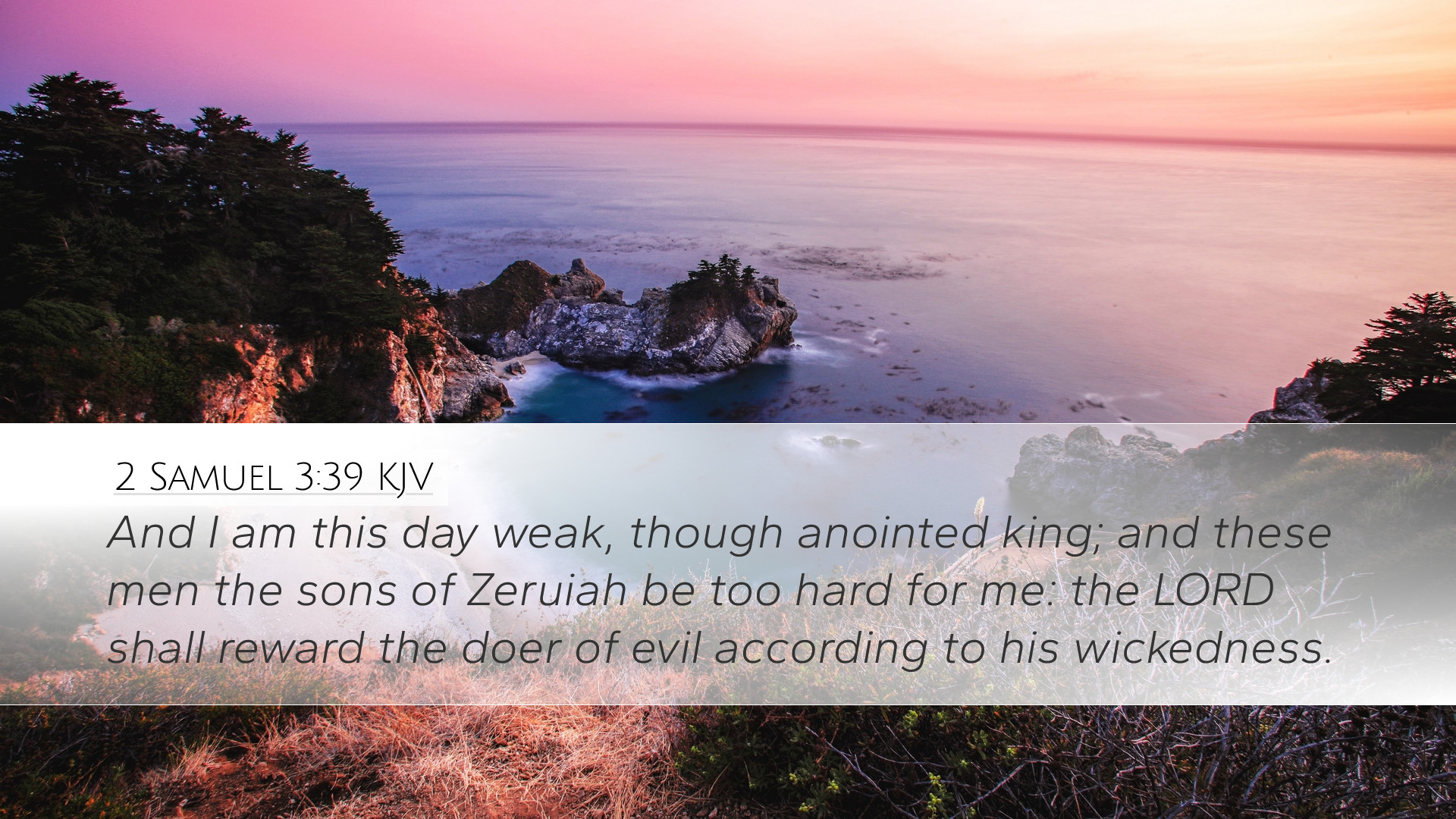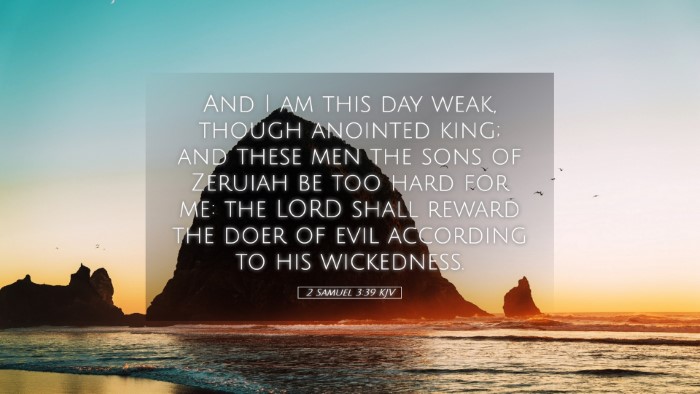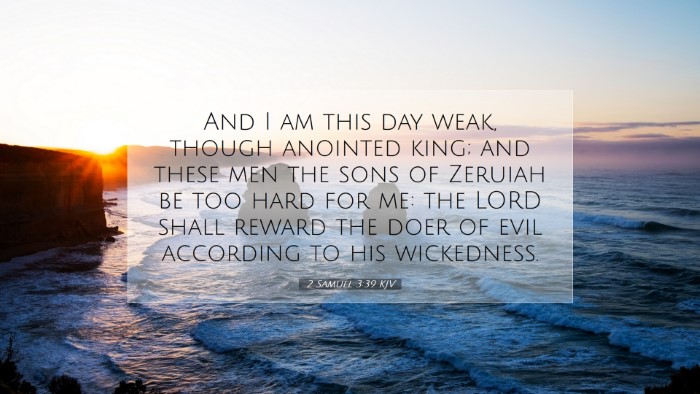Commentary on 2 Samuel 3:39
Verse: 2 Samuel 3:39 - "And I am this day weak, though anointed king; and these men the sons of Zeruiah be too hard for me: the Lord shall reward the doer of evil according to his wickedness."
Contextual Overview
This verse is situated within a pivotal moment in the narrative of 2 Samuel, capturing the emotional and political turmoil in the reign of David following the death of Saul and the subsequent civil strife between the house of Saul and the house of David. In this verse, David reflects not only on his personal state but also on the political reality surrounding him, revealing the complexity of leadership and divine sovereignty.
Insights from Public Domain Commentaries
Matthew Henry's Commentary
Matthew Henry emphasizes the duality of David’s condition—despite being anointed as king, he finds himself in a state of weakness. This underscores the theme of divine providence in leadership, suggesting that anointing does not exempt one from trials. David acknowledges his vulnerability and the threats posed by men like Joab and Abishai, whom Henry describes as "the sons of Zeruiah," known for their fierce loyalty but also their ruthless nature.
Henry articulates that power dynamics are often fraught with difficulty, especially within God's chosen leadership. He notes that David’s leadership is marked by a recognition of his limitations and an appeal to God for justice and providence in dealing with the adversaries he faces. This moment is significant as it illustrates the balance between human agency and divine sovereignty—David looking to God for vindication.
Albert Barnes' Notes on the Bible
Albert Barnes offers a detailed analysis of the phrase "these men the sons of Zeruiah be too hard for me." He expounds on the complexities of David's relationship with Joab, highlighting Joab's ambitious nature and the potential threat he poses to David's kingdom. Barnes suggests that Joab's ruthless actions are indicative of the broader challenges David faces from within his own ranks.
Barnes elucidates that David's acknowledgment of his weakness serves as a poignant reminder of the burdens of leadership and the necessity of divine assistance. He further interprets David's statement regarding the Lord rewarding evildoers as a firm declaration of his faith in God’s justice, reiterating the importance of moral integrity and the assurance that God will ultimately execute judgment on those who act wickedly.
Adam Clarke's Commentary
Adam Clarke delves into the emotional weight borne by David in this statement. He reflects on the sense of isolation and the physical toll leadership can take, despite having been chosen by God. Clarke suggests that David's perceptiveness regarding the threat posed by Zeruiah’s sons indicates a wise and discerning leader who is aware of the political realities surrounding him.
Clarke also emphasizes God's sovereignty in bestowing authority and the idea that anointing does not equate to immunity from challenges. His reference to God's future judgment on the wicked is interpreted as both a comfort and a warning; a comfort in knowing that justice will prevail, and a warning about the consequences of dissension and rebellion in the ranks of God’s chosen leaders.
Theological Themes
- The Paradox of Leadership: David's acknowledgment of his weakness illustrates the paradoxes inherent in leadership. While he holds the title of king, he is keenly aware of his vulnerability.
- Divine Sovereignty: The verse poignantly reflects the sovereignty of God in the affairs of men, especially in the consequences of evil deeds. David entrusts justice to the Lord.
- The Reality of Internal Conflict: David’s conflicts are emblematic of the internal struggles that can exist within leadership, particularly with loyal but potentially dangerous allies.
- Faith in Justice: David’s declaration about the Lord rewarding evil doers reinforces the belief that, despite current tribulations, God's justice will ultimately prevail.
Application for Contemporary Readers
This verse speaks profoundly to contemporary pastors, theologians, and lay leaders who experience the burdens of leadership. The weight of responsibility, the threats from within, and the call to lean on God for strength and guidance are perennial themes that resonate across ages.
Furthermore, the caution about inner conflict and the need for moral integrity becomes especially relevant in contexts where leadership is challenged by self-interest and ambition. Leaders are reminded to seek God’s wisdom and to understand that their authority must be exercised with humility and a recognition of their dependence on divine grace.
In conclusion, 2 Samuel 3:39 serves as both a sobering reminder of the realities of leadership and an encouragement to maintain faith and integrity in the face of adversity. It calls readers to reflect on the nature of true power and influence, rooted in the will of God and expressed through just and righteous actions.


